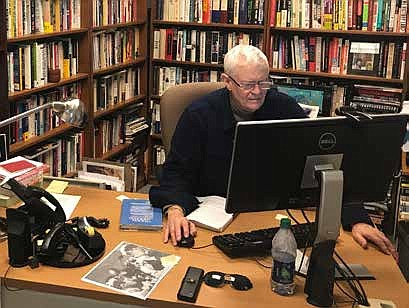Former Press Secretary Remembers His Time Inside Mayor Washington’s Head
Former Press Secretary Remembers His Time Inside Mayor Washington’s Head
By Katherine Newman
After three decades, former press secretary to Mayor Harold Washington, Alton Miller, still remembers the 1,000 days he spent working in city hall. Even more, he members his relationship with the Mayor as his speech writer and how he felt immediately following his death.
“I think most of us who were involved in the administration were naively, candidly and openly aware that we were participating in a wonderful adventure,” said Miller.
Miller always knew, as his speech writer, that he had a responsibility to show the city the real Mayor Washington because an imaginary figure would have never been accepted.
“I was more in his head as a speech writer than I was as the spokesperson and making announcements,” said Miller.
A speech writer is a force for intellectual consistency, logic and persuasions, according to Miller. His goal was to always be true to the agenda and passions of the Mayor while creating speeches that were
interesting to the public and the media.
“We had differences of opinion within the administration of how he should be presented,” said Miller.
The duo struggled with people claiming Mayor Washington was not mayoral enough, that he should be more remote and less accessible.
Miller remembers that Mayor Washington always wanted to walk through a crowd on his way to the stage and not enter from the back. He refused to
wear a bullet proof vest during these walks which put his security team on high alert.
Mayor Washington had run for Mayor once before his historic win in 1983. He had to be seriously convinced to run again after his first loss. His
supporters assured him that he was the choice of the movement.
“If he had been a white Mayor with his agenda, he probably couldn’t have gotten elected.
“The fact that he had a black base and he added to that black base allowed him to have a progressive agenda and get elected to Mayor of Chicago,” said Miller.
Mayor Washington was one of very few black politicians at the time, this gave him a remarkable amount of support from black communities. He also
was able to gain the support of hispanic communities and liberal voters in Chicago, according to Miller.
After being elected the first black Mayor of Chicago, Mayor Washington cast a wide net in order to find people to work in his administration and Miller is a good example of that. He was working as a ballet director when he was recruited to apply for a position in the Mayor’s office.
During his time in office, Mayor Washington struggled with the iconic 21-29 split in city council.
“There’s 50 alderman. Twenty-nine of them were organized in opposition of the Mayor and they could pass anything they wanted with 29 votes, as they reminded us ceaselessly,” said Miller.
Mayor Washington relied on the power of his veto to keep the political agenda moving fin the direction he wanted. Miller describes the process as this, city council would pass something bogus, the Mayor would veto, then principal members from both sides would meet and reach a compromise.
“Everything that needed to get done could get done, it just took an extra
step,” said Miller. Miller was with Mayor Washington in his office when he died.
“When he died you knew instantly that chapter of Chicago’s history was
over.”
“He had taught us to handle crisis with sober, sensible, politically feasible responses so now as he lay there on the floor, that was just the last crisis that we were going to have to handle together,” said Miller.
The weeks following his death were what Miller called “bloody politics.” While he sat at the hospital waiting for the Mayor to be pronounced dead, everyone else was at city hall struggling to decide who would carry the
flame that Mayor Washington ignited.
“The truth was that there was no replacement for Harold Washington,” said Miller.
After his death Miller spent two years writing Harold Washington: The Mayor, The Man which was published in 1989.
He is now a Public Relations professor at Columbia College and has not returned to municipal government since is resignation 48 hours after Mayor Washington’s death.
Latest Stories
- Remembering Our Purpose – A Tribute to James Alfred Washington
- NAN Gathering Plans to Bring Drug Discount Concerns to Federal Reps
- Caregivers Honored at Inaugural Dear Me Care Circle
- Law Day at South Suburban College: A Resounding Success!
- ‘Mamma Mia!’ Actress Revels In 25th Anniversary Of Musical
- re-OrientationS Showcases The Work Of Interdisciplinary Artists
- Surge Institute Empowers Leaders Of Color In Education
- Woman’s Outreach Blesses Others With Much Needed Supplies
- Illinois Chapter of the Alzheimer’s Association Hosted Second Annual African American Release the Silence: RACE into Action Conference
- Artist And Musician Uses Talent To Heal
Latest Podcast
This Is Life

